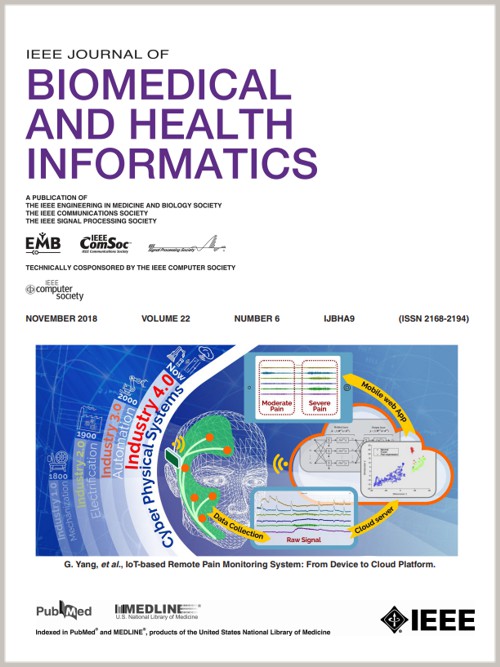SCKansformer:通过 Kansformer 骨干和分层注意机制对骨髓细胞进行精细分类。
IF 6.7
2区 医学
Q1 COMPUTER SCIENCE, INFORMATION SYSTEMS
IEEE Journal of Biomedical and Health Informatics
Pub Date : 2024-10-10
DOI:10.1109/JBHI.2024.3471928
引用次数: 0
摘要
急性白血病等恶性肿瘤的发病率和死亡率大幅上升。在临床上,医院依靠外周血和骨髓涂片的细胞学检查来诊断恶性肿瘤,其中准确的血细胞计数至关重要。现有的自动化方法在处理高维显微图像数据时面临着特征表达能力低、可解释性差和冗余特征提取等挑战。我们针对骨髓血细胞提出了一种新的细粒度分类模型 SCKansformer,它能解决这些难题,并提高分类的准确性和效率。该模型集成了 Kansformer 编码器、SCConv 编码器和全局-局部注意力编码器。Kansformer 编码器用 KAN 取代了传统的 MLP 层,改进了非线性特征表示和可解释性。SCConv 编码器具有空间和通道重构单元,可增强特征表示并减少冗余。全局-局部注意力编码器将多头自我注意力与局部模块相结合,以捕捉全局和局部特征。我们使用与合作医院共同开发的骨髓血细胞精细分类数据集(BMCD-FGCD)验证了我们的模型,该数据集包含 10,000 多个样本和近 40 个分类。在我们的私有数据集以及公开的 PBC 和 ALL-IDB 数据集上进行的对比实验表明,SCKansformer 在所有数据集上的表现都优于典型的和先进的微细胞分类方法。本文章由计算机程序翻译,如有差异,请以英文原文为准。
SCKansformer: Fine-Grained Classification of Bone Marrow Cells via Kansformer Backbone and Hierarchical Attention Mechanisms
The incidence and mortality rates of malignant tumors, such as acute leukemia, have risen significantly. Clinically, hospitals rely on cytological examination of peripheral blood and bone marrow smears to diagnose malignant tumors, with accurate blood cell counting being crucial. Existing automated methods face challenges such as low feature expression capability, poor interpretability, and redundant feature extraction when processing high-dimensional microimage data. We propose a novel fine-grained classification model, SCKansformer, for bone marrow blood cells, which addresses these challenges and enhances classification accuracy and efficiency. The model integrates the Kansformer Encoder, SCConv Encoder, and Global-Local Attention Encoder. The Kansformer Encoder replaces the traditional MLP layer with the KAN, improving nonlinear feature representation and interpretability. The SCConv Encoder, with its Spatial and Channel Reconstruction Units, enhances feature representation and reduces redundancy. The Global-Local Attention Encoder combines Multi-head Self-Attention with a Local Part module to capture both global and local features. We validated our model using the Bone Marrow Blood Cell Fine-Grained Classification Dataset (BMCD-FGCD), comprising over 10,000 samples and nearly 40 classifications, developed with a partner hospital. Comparative experiments on our private dataset, as well as the publicly available PBC and ALL-IDB datasets, demonstrate that SCKansformer outperforms both typical and advanced microcell classification methods across all datasets.
求助全文
通过发布文献求助,成功后即可免费获取论文全文。
去求助
来源期刊

IEEE Journal of Biomedical and Health Informatics
COMPUTER SCIENCE, INFORMATION SYSTEMS-COMPUTER SCIENCE, INTERDISCIPLINARY APPLICATIONS
CiteScore
13.60
自引率
6.50%
发文量
1151
期刊介绍:
IEEE Journal of Biomedical and Health Informatics publishes original papers presenting recent advances where information and communication technologies intersect with health, healthcare, life sciences, and biomedicine. Topics include acquisition, transmission, storage, retrieval, management, and analysis of biomedical and health information. The journal covers applications of information technologies in healthcare, patient monitoring, preventive care, early disease diagnosis, therapy discovery, and personalized treatment protocols. It explores electronic medical and health records, clinical information systems, decision support systems, medical and biological imaging informatics, wearable systems, body area/sensor networks, and more. Integration-related topics like interoperability, evidence-based medicine, and secure patient data are also addressed.
 求助内容:
求助内容: 应助结果提醒方式:
应助结果提醒方式:


